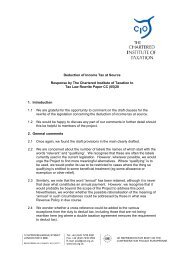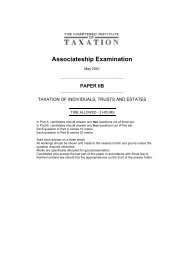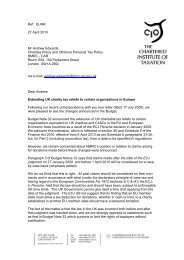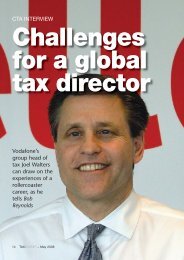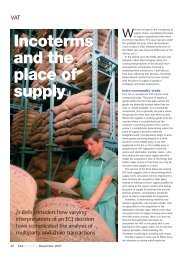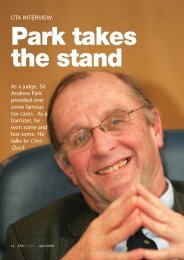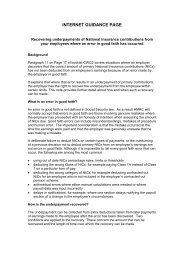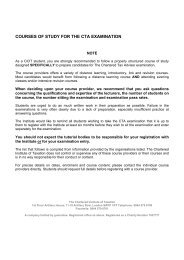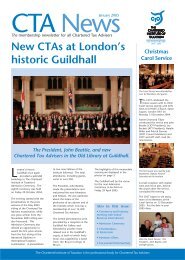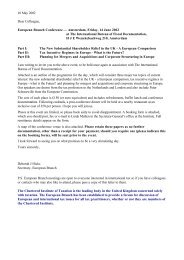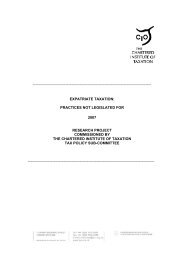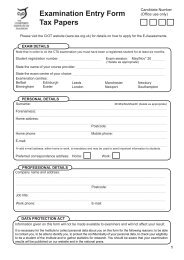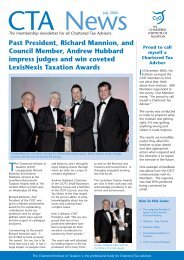Reasonable Business Expense - The Chartered Institute of Taxation
Reasonable Business Expense - The Chartered Institute of Taxation
Reasonable Business Expense - The Chartered Institute of Taxation
You also want an ePaper? Increase the reach of your titles
YUMPU automatically turns print PDFs into web optimized ePapers that Google loves.
<strong>Reasonable</strong> <strong>Business</strong> <strong>Expense</strong>s: Discussion paperamong taxpayers. Logically, this would imply the taxation <strong>of</strong> intangiblessuch as leisure time and self-supply imputed income from services. 183However, it pr<strong>of</strong>fers no tool to measure with precision such constituentelements <strong>of</strong> ‘welfare’ inclusive <strong>of</strong> such individual traits as physical,mental and financial endowments and economic and social opportunities,as well as unique tastes and human capital. Thus, while appealing (atleast to the revenue authorities) in suggesting that the sum <strong>of</strong> individuals’comprehensive endowments should be brought to tax, it fails to providethe benchmark for measuring this, compelling tax policymakers to resortto other concepts such as ‘income’ to serve as a close substitute. 184Edgar 185 considers the optimal rules relating to the deductibility <strong>of</strong>expenses that may influence the concept <strong>of</strong> taxable consumption underan ideal personal income tax base. Following the optimal tax tradition,Edgar examines the implications these ‘use <strong>of</strong> funds’ tax bases suggestfor the development <strong>of</strong> rules governing the deductibility <strong>of</strong> expenses. Inthis analysis, the Haig-Simons accretion concept <strong>of</strong> income 186 based onconsumption and accumulation suggests that the comprehensive tax baseshould be used as a benchmark for taxable income. As regards thedeductibility <strong>of</strong> expenses, only outlays expended in the income-earningprocess should be deductible, as Haig-Simons income distinguishesbetween the income-earning and pr<strong>of</strong>it distribution processes. Asexpenditure incurred to produce income will ultimately be taxed once thatincome is realised, tax should be assessed on a net, as opposed to a183184185186Tim Edgar (1997) <strong>The</strong> Concept <strong>of</strong> Taxable Consumption and theDeductibility <strong>of</strong> <strong>Expense</strong>s under an Ideal Personal Income Tax Base, in R.Krever ed. Tax Conversations, (Great Britain: Kluwer Law International), p.300.Kevin Holmes, (2000) <strong>The</strong> Concept <strong>of</strong> Income: A Multidisciplinary Analysis,IBFD Doctoral Series Vol. 1, IBFD Publications BV, pp. 9 – 14; 30 – 33.Tim Edgar (1997) <strong>The</strong> Concept <strong>of</strong> Taxable Consumption and theDeductibility <strong>of</strong> <strong>Expense</strong>s under an Ideal Personal Income Tax Base, op cit.Essentially, the algebraic sum <strong>of</strong> market rights exercised in consumptionand the change in market value <strong>of</strong> the store <strong>of</strong> property rights over therelevant period: see Henry Simons (1938), Personal Income <strong>Taxation</strong>(Chicago: Univ. <strong>of</strong> Chicago), p. 17. See also, Tim Edgar (1997) <strong>The</strong> Concept<strong>of</strong> Taxable Consumption and the Deductibility <strong>of</strong> <strong>Expense</strong>s under an IdealPersonal Income Tax Base, op cit, p. 298.Bode OyetundePage 34 <strong>of</strong> 63PhD CandidateCentre for Commercial Law StudiesQueen Mary & Westfield College




